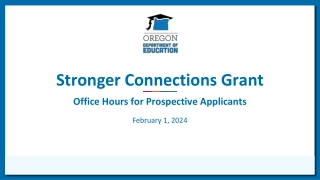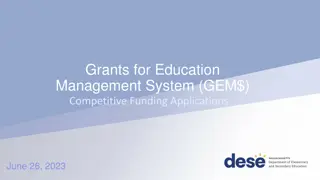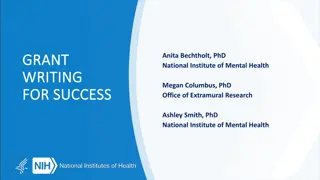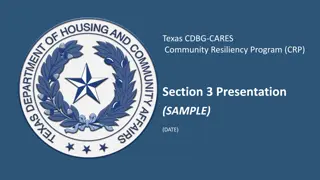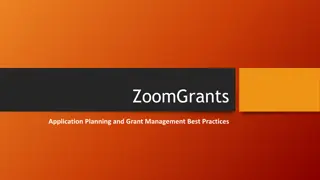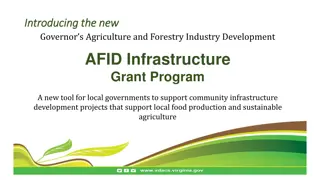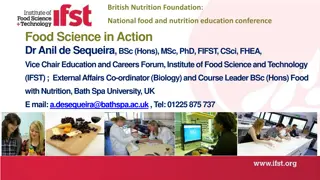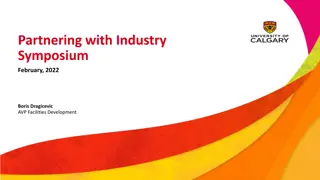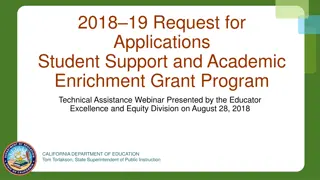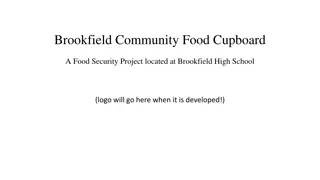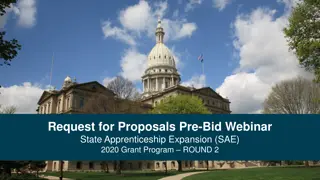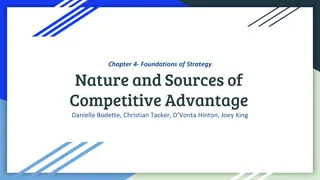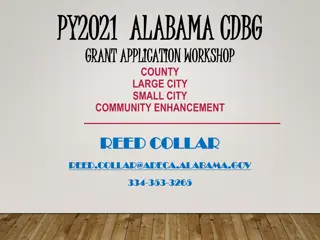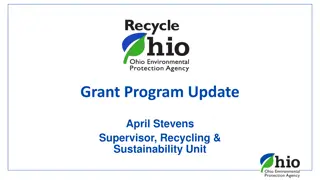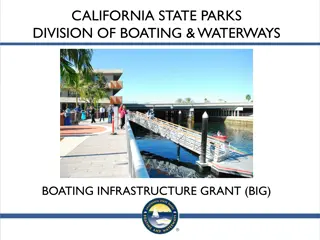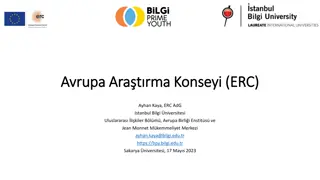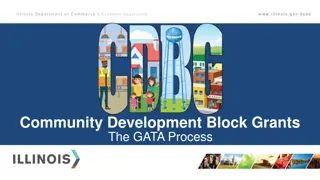Community Food Projects Competitive Grant Program Overview
The FY 2019 Community Food Projects Competitive Grant Program aims to address food insecurity by supporting community food projects for low-income communities. With grant opportunities for different project types and specific goals like meeting food needs, promoting self-reliance, and connecting various sectors of the food system, the program encourages innovative solutions to local food challenges.
Download Presentation

Please find below an Image/Link to download the presentation.
The content on the website is provided AS IS for your information and personal use only. It may not be sold, licensed, or shared on other websites without obtaining consent from the author.If you encounter any issues during the download, it is possible that the publisher has removed the file from their server.
You are allowed to download the files provided on this website for personal or commercial use, subject to the condition that they are used lawfully. All files are the property of their respective owners.
The content on the website is provided AS IS for your information and personal use only. It may not be sold, licensed, or shared on other websites without obtaining consent from the author.
E N D
Presentation Transcript
FY 2019 Community Food Projects Competitive Grant Program Presenters: Dr. Jane Clary Loveless, NPL Dr. Pascale Jean, Program Specialist Adriene Woodin, Branch Chief for AMD Susan Bowman, Branch Chief for AMD
FY 2019 CFP Proposals Important Date Due date: June 3rd at 5 p.m. EST New Users of Grants.gov, please read page 11 of RFA carefully, as DUNS and SAM number registration takes several weeks to complete. It is critical to begin as soon as possible. Do NOT wait until the last minute. You may submit a few days early.
Community Food Projects Competitive Grant Program (CFPCGP) Fight food insecurity through developing community food projects that help promote the self-sufficiency of low-income communities. Increase food security by bringing the whole food system together to assess strengths, establish linkages, and create systems that improve the self-reliance of community.
Project Types Community Food Projects (CFP)- Not to exceed $400,000 over four years Matching funds required Planning Projects (PP)- Not to exceed $35,000 and not to exceed three years Matching funds required
CFP-Purpose & Priorities: Primary Goals Meet the food needs of low-income individuals Increase the self-reliance of communities Promote comprehensive responses to local food, farm, and nutrition issues
CFP-Purpose & Priorities: Primary Goals, cont. Meet specific state, local, or neighborhood food and agricultural needs: * Equipment necessary for efficient operation, Planning for long-term solutions, and Creation of innovative marketing activities.
CFP- Purpose/Priority Develop connections between two or more sectors of the food system Support the development of entrepreneurial projects Develop innovative connections between the for-profit and nonprofit food sectors, or Encourage long-term planning activities.
CFP - Purpose/Priority (contd) * Develop new resources & strategies to help reduce food insecurity in the community & prevent food insecurity in the future: Develop creative food resources, Coordinate food services with park and recreation programs, and (such as summer feeding programs) Include nutrition education programs for at-risk populations, enhance food purchasing & food-prep skills * (EFNEP & SNAP-ED opportunities)
Examples of CFP Projects example include, but not Limited to: Community gardens with market stands, Value chain projects Food hub Farmers markets CSAs Farm-to-institutions projects Corner markets and mobile markets
Planning Projects (PP): Purpose Connections between two or more sectors of the food system; The development of entrepreneurial projects; & Innovative connections between the for-profit and nonprofit food sectors.
Planning Projects examples include, but not Limited to: Community Food Assessments and coordination of collaborative development, GIS development, GIS analysis, Food sovereignty study, & Farm-to-institution.
Eligible Applicants Public food program service providers, tribal organizations, or private nonprofit entities, including gleaners meeting the four requirements: 1. Experience in the area: Community food work, particularly small and medium-size farms, Job training and business development for food related activities in low income communities, and efforts to reduce food insecurity in the community, including food distribution, improving access to services, or coordinating services.
Eligible Applicants (contd) 2. Demonstrate competency to implement a project, provide fiscal accountability, collect data, and prepare reports and other necessary documentation. 3. Demonstrate a willingness to share information with researchers, evaluators, practitioners, and other interested parties. 4. Collaborate with 1 or more local partner organizations to achieve at least 1 hunger-free communities goal. Visit http://www.hungerfreecommunities.org/wp- content/uploads/2011/04/Hunger-Free-Communities-A-Toolkit- for-Congressional-Staff.pdf
Partners and Collaborators CFP or PP awards are encouraged to seek and create partnerships with public or private, non-profit or for-profit entities: including links with academic institutions local government entities Cooperative Extension Service Food banks and pantries Only the applicant must meet the eligibility requirements See pages 9 10 of the RFA for more details.
Cost Sharing or Matching CFP and PP applicants MUST provide matching on a dollar-for-dollar basis for all federal funds awarded. Matching funds may be provided through cash and/or in-kind contributions fairly evaluated, including facilities.
Evaluation CFP proposals contain a strong evaluation component. Innovative evaluation strategies are especially encouraged. Evaluations focus on logic models and the measurement of Indicators of Success in meeting the legislative goals and objectives of the CFPCGP. Awardees are expected to contribute data to the annual report each year. New Entry Sustainable Farming Provides T & TA Support.
New Entry Sustainable Farming Training & Technical Assistance Jennifer Hashley- Project Director, New Entry Sustainable Farming, Jennifer.Hashley@tufts.edu Phone: 617-306-4879 Kristen Irvin, National Technical Assistance Coordinator Kristen.Irvin@tufts.edu, Phone: 978-654-6745
NIFA Staff Dr. Jane Clary Loveless, NPL 202-720-3891 jclary@nifa.usda.gov Dr. Pascale Jean, Program Specialist 202-720-6079 Pascale.Jean@nifa.usda.gov


